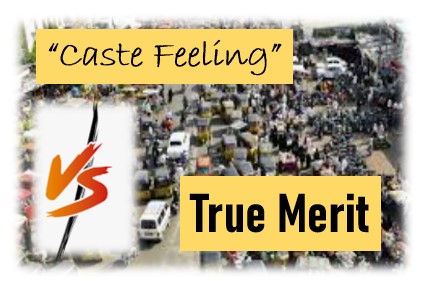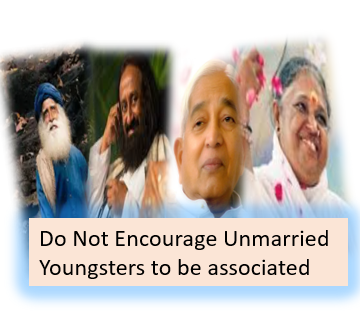Recently, while chatting with my sister, my wife said, “Sarada, our lives are simple.” I do not why we make a simple life complicated.
This reminded me of an incident several years ago.
We were having a discussion at home regarding God and the acceptable adoption of religious practices. The conversation was going nowhere, and not being a scientist or theoretician who revels in keeping others in limbo, my dear father said, with his characteristic uniqueness, “I am a normal human being.” In this one statement, he put things in perspective.
Let us take a step back and ponder. Our lives are often a drama, driven by our actions, responses to insecurities, imagined solutions to problems, stubborn goal pursuits, and illusory strategies for success.
‘Caste Feeling’ is, in my view, a response, perhaps even a commercial reaction, to these insecurities and a group’s or society’s approach to life at a particular time. We are following it blindly, as we normal people tend to do in most cases. The hierarchical representation of the “Caste System” as we understand it, was likely theorized and documented by a theoretician, and scientists possibly with funding patronage from a King or University of a bygone era. It’s easy to imagine how power structures might have formalized several existing social conditions and divisions.
The Caste System, which likely originated in Vedic times, may have initially been an attempt to preserve the Vedas. The creators of these texts probably understood the human rigor needed to recite and safeguard their profound work. And, needed a sect of people who inherited several practices from an young age.

Thriving on Chaos
After all, every inventor or scientist recognizes the preciousness of their creation. However, what evolved later was a loosely structured, and often commercially driven, system. While it maintained the Brahmins and Kshatriyas at the top, the code below became increasingly influenced by economic factors.
Today, after several centuries, where we do not know how things evolved, we predominantly see a commerce-driven caste system. Politics, the largest money-earning profession in India, is significantly influenced by caste. The movie industry, another major economic force, is also caste-driven in some regions. This intertwining of caste and commerce means that people often place their trust in those of the same caste, as it seems to offer greater security for their economic interests. This phenomenon isn’t unique to India; history is replete with examples of social groups coalescing around shared interests, be they familial, religious, or economic. Caste, in this context, provides a pre-existing framework for such cohesion.
So, “Caste Feeling” is essentially “Trust.” In the common man world where trust matters, people of same caste trust each other more. And trust, as we know, is addictive. It fosters a powerful sense of security and a degree of leniency towards mistakes, because dwelling on errors could jeopardize the overarching sense of security and mutual benefit. This trust, however, often doesn’t extend beyond the boundaries of necessity.
How do people with “Caste Feeling” live their lives? Just look around. Consider the rich and influential groups: the Reddys in Andhra politics, the Kammas and Kaapus in the Telugu film industry, the Lingayats in Karnataka politics, the upper echelons of the Indian Civil Services until the 1980s, and the trading communities of Gujarat and Maharashtra. These are just a few examples of how caste-based networks can operate.

Election Commission of India’s feeble attempt to dissuade politicians bring caste into their election canvasing
It’s difficult or futile to list every behavioral pattern associated with “Caste Feeling,” We know when we see one. While it is depressing when we encounter it, as a normal human generally lives on true merit, it is also a reality of life.
But one thing is clear: across the board, the trust factor creates a sense of ease and comfort among people of the same caste. Conversely, interactions with those from other castes tend to be more guarded and “transactional.”
So, what was my wife really saying? in her chat with her sister in law.
Was it a subtle suggestion that our stability should lead to a more happy relationship?
Or has she, perhaps, gained the wisdom of my father?
Or, is someone subtly influencing my wife, sidetracking her ambition, by repeatedly implying that a “simple life” is sufficient, potentially hindering her pursuit of greater success?
While nature designed a merit-based system of life, with factors like advantageous genes, early childhood nutrition, and serendipity playing a role in success, “Caste Feeling” imposes a biased system on society and individuals. This can stifle intelligence and lead to a life not primarily determined by merit.
This is abundantly evident in India, with its lawless tendencies, high inflation, superstition, corrupt bureaucracy, heavy reliance on imports of high-tech goods, inadequate non dependable medical care, and a rigid education system. The current attraction of India, its high economic growth, often overshadows the crucial question of who it really benefits.
We do not discuss all this as we know, we aren’t dominant players in the key sectors driving this growth.
Whether a society steeped in “Caste Feeling” can effectively absorb this touted growth and translate it into a better standard of living for its “common people” remains a significant question.
True progress would mean the opposite of our current reality:
- a lawful
- low-inflation
- non-superstitious
- less corrupt bureaucracy
- indigenous manufacturing of high-tech goods
- high-quality medical care
- and an open education system
This is a formidable challenge, given the structures we have built since independence as the biggest causality of “Caste Feeling” is “True Democratic Merit”. India is the worlds largest democracy with competition between such caste groups and characterized by a “Downward spiral of merit buried in Caste Feeling”.






